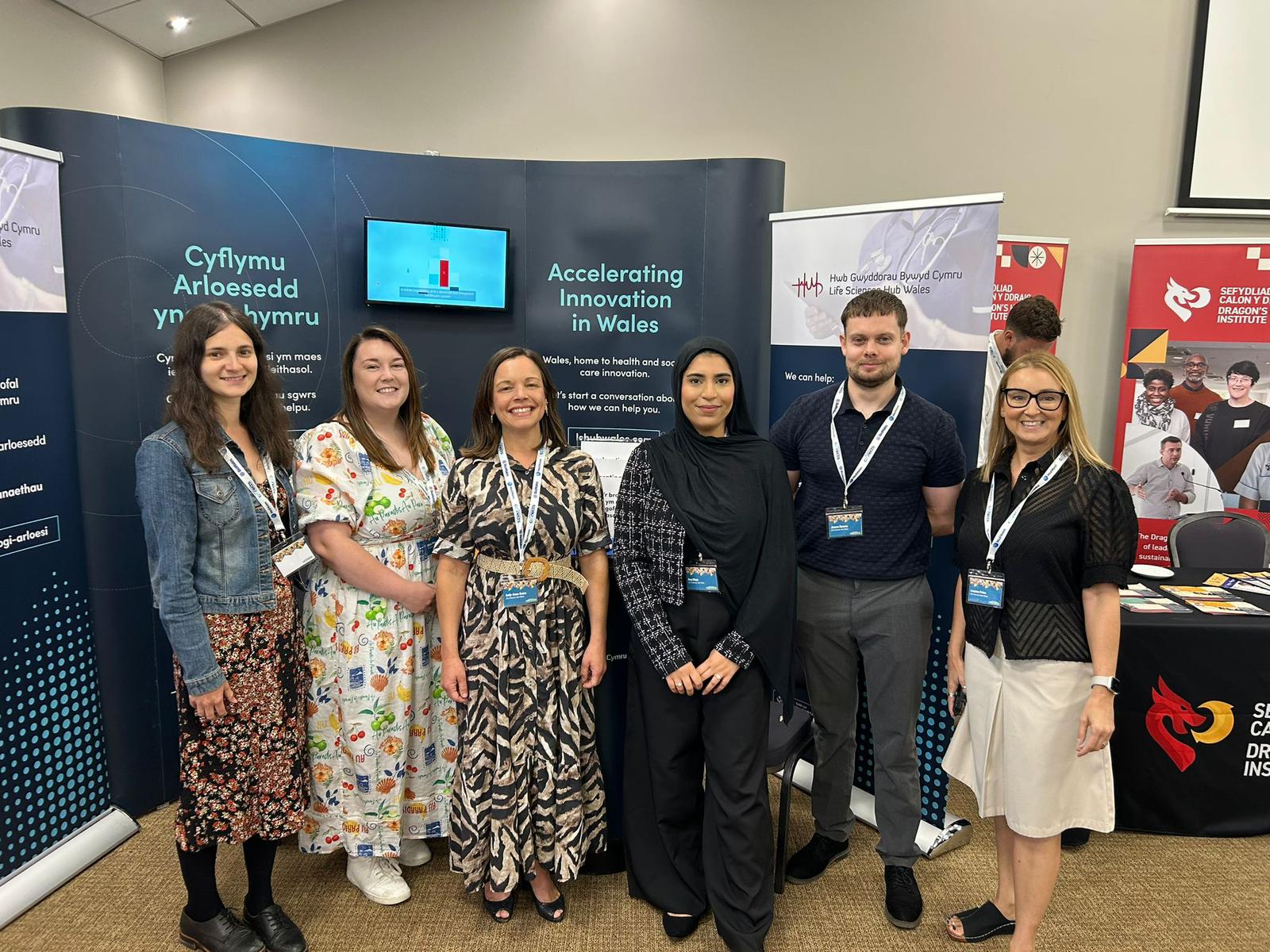This year’s MediWales Connects drew hundreds of attendees from health, industry, social care and government to share learning and explore challenges and opportunities. Here’s what we got up to on the day and what we took home from it.

Our team were delighted to attend the annual MediWales Connects conference! We heard from a diverse range of speakers, from midwives to patient advocates to leaders working at the forefront of cancer innovation. There were so many insightful perspectives, which we’ll take back with us and apply to our work driving innovation to the frontline of health and social care.
A mindset shift is needed to bring the focus of innovation onto outcomes
Across a few talks, we heard about the importance of measuring and considering impact and outcomes when it comes to innovation. Luella Trickett, Executive Director, Medical Devices, Value and Access, at The Association of British HealthTech Industries (ABHI) discussed how there is often a huge focus on a solution’s price when in reality the focus on outcomes is more important for creating value in the long term. Put simply, she stressed that funding innovation is an investment, not a cost. She highlighted that while Wales is a well-established leader in Value Based Health Care, this needs to be pushed further in our nation and beyond.
We also heard from Natalie Pryor and Chloe Mangall from the North Wales Regional Partnership Board, who spoke about how best to capture outcomes and impact of work using Ripple Effects Mapping (REM) to capture and map its impact. This is particularly useful for understanding complex consequences, especially where traditional evaluation methods fall short. They found that this tool could help spread and scale and bring people together across the system.
The importance of co-production and listening to patient and frontline voices
Our very own Louise Baker, Project Lead here at Life Sciences Hub Wales, explored how we need to empower teams within the community to embrace innovation within a social care setting.
Louise used our digital medication management and VR training solution projects as examples of how innovation can improve quality of life for service users, drive value and empower social care staff. She highlighted the importance of including their voices in the design of an innovation project or pilot, and how it’s a vital opportunity to think differently and create change.
Jemin Popat, a beta-thalassemia patient, also spoke at the event about his experiences. Until recently, beta-thalassemia had no cure, was life limiting and would require thousands of hospital visits over a lifetime. However, recent advances in gene therapy have made a cure possible.
Jemin spoke about the importance of centring patient voice in the development and delivery of novel therapies. While many would assume most patients would jump at the chance of treatment, this isn’t always so clear cut and it’s critical to understand why from a patient perspective and help remove these barriers – such as time away from family and travel costs – if possible.
Continue embracing the potential of digital technology in health and social care
Digital innovation was a major theme running across the day. We were pleased that Luella Trickett recognised Life Sciences Hub Wales as an important organisation for driving this forward in Wales through our range of support services.
We learnt from Asad Javied, Hartree Centre Cardiff Hub, about how his team are supporting life sciences organisations in integrating artificial intelligence into their work. This includes knowledge and data analysis, image and video processing, and chat bots and language models.
Digital exclusion was also discussed. While digital innovation has the potential to transform healthcare for the better, not everyone can access it and people risk being left behind. Cheri Lewis, Senior Midwifery Information Officer at Cwm Taf Morgannwg University Health Board, spoke about how giving pregnant people preloaded SIM cards positively impacted not just their antenatal care but their wider lives.
They were not only able to contact triage if needed and speak to their midwife for advice, it also helped their children to complete online homework and kept them connected with loved ones. There’s a much broader conversation to be had about the importance of making sure everyone is kept within the digital ecosystem as this technology continues to be embedded into all areas of our lives.
Wales is home to some inspiring cancer innovation projects and programmes
We heard from the Cardiff Cancer Research Hub (CCRH) about how a new partnership between Velindre University NHS Trust, Cardiff and Vale University Health Board and Cardiff University is helping to deliver ground-breaking trials in Wales.
We learnt how the CCHR is translating current and future research into promising outcomes for cancer patients. Trials currently underway here include:
- ATTEST: Deploying the trocept virus, which is modified to exclusively kill cancer cells.
- Iovance: Uses tumour infiltrating lymphocytes (TIL), which are naturally occurring immune cells that fight cancer. A patient’s naturally occurring TIL are collected, grown outside the body and then delivered back in to target solid tumour cancer cells.
The event finished with Rob Orford, our Lead Tackling Cancer Advisor, giving a summary of our Tackling Cancer programme, which we manage on behalf of Welsh Government in partnership with a range of organisations including the Wales Cancer Industry Forum, Wales National Cancer Team and Health Care and Research Wales.
We aim to build trusted partnerships between health and care providers, industry and academia, accelerating the delivery of evidence-based, proven, disruptive solutions to transform cancer survival rates in Wales.
Whether it’s pioneering cancer clinical trials or social care projects transforming the lives of services users, Wales is an exciting place to be an innovator right now. MediWales Connects continues to exemplify this.
If you’d like to find out more about how we can support you in getting innovation to the frontline of health and social care in Wales, please visit our support services page.

